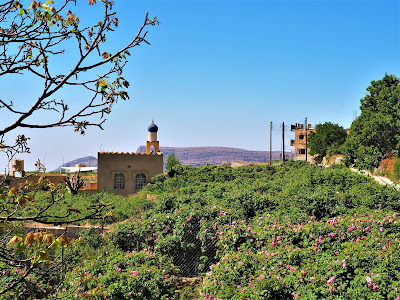The secret of rose water - rose blossoming in Jabal Akhdar
Jabal Akhdar - the Green Mountain. It is part of the Hajar Mountains, and it rises to 2980m. The weather is always cooler than in Muscat - when we visited in December, during the day the temperature was in the pleasant mid 20 range while in the evening it dropped drastically, below 10 degrees (Celsius). In March during the day it was closer to 30 degrees when in Muscat we had around 37.
The mountain was restricted until the end of the 90's - only people who lived there were allowed in, expats or other residents could not visit (the military base might have something to do with this regulation). Then the late Sultan declared the area as nature reserve in 2011, a new road was built, and a major urbanization development took place on Saiq plateau at 2000m which led to the rise of a modern town of Saiq Qatanah. Many villagers from remote areas moved in to enjoy the comfort of modern living conditions, like running water and electricity, schools and hospitals but many of them still regularly goes back to their old village and maintain their farms there.
Today the area is easily accessible although 4WD is mandatory as roads are steep. There are two luxury hotels to choose from: Alila and Anantara and there are many other local ones and guesthouses - and more are under construction.
More posts about our trips in Jabal Akhdar: HERE. The overview of all hiking trails we got to know of in this area is here. Our detailed description of the three-village hike which is the best hike also for discovering the rose gardens is HERE.
Rose blossoming tour - three-village hike in Jabal Akhdar
Jabal Akhdar is famous for its terraced orchards where pomegranates, apricots, roses and many more plants grow. The rose season is on from March to end April, May - this is when the Damask roses are blossoming. We opted for a guided tour organized by Anantara where we stayed for a few days - and we did not regret it. Our guide, Maher was born and raised in Jabal Akhdar, spoke perfect English and shared so much information and insight.
We first visited one of the farms where roses are grown - in fact along the route of the village walk (read about it here) you can find many terraces with roses and this farm was in Al Ain, the second village of route 18. The roses are hand-picked early morning, when they are still covered with dew and they are processed immediately. Each bush yields about 15-20kg of petals during the season, while it takes about 2kg of petals to generate 250ml of essence as we were told. The roses have such a beautiful smell! There are 2 methods to distill - the cold and the warm. The cold method will produce white rose water and water is added during the process. The warm method is the traditional in Jabal Akhdar and it will produce yellow water. We visited one of these old distilleries where we met one of the family members who explained the process.
Rose petals are distilled at the traditional mud ovens called “Al-duhjan.” The petals are allowed to simmer gently for about four hours in a vessel called “Al-burmah,” which is covered by another vessel made of copper - and they are sealed with a small container filled with cold water. As it boils, water flows from the petals into the copper vessel. After boiling, the rose water is poured into a large pot known as “Al-karas,” where it remains there for at least 30 days. On top of the rose water a layer of black substance develops - this is than collected and used as ointment to reduce pain of the joints. As the oven is fueled with wood, the rose water has a distinctive smoky smell.
We also learnt that once blossoming is over, the bushes are left to dry out and they loose all their leaves - they are not irrigated for a couple of months. After the resting period they are prepared for the new season - they are pruned, irrigated and cared for to be ready for the new season.
Rose water is widely used in the Middle East in medicinal, culinary and celebratory purposes. A few drops to coffee or tea will transport anyone to the magical world of the 1001 nights tales!















Comments
Post a Comment